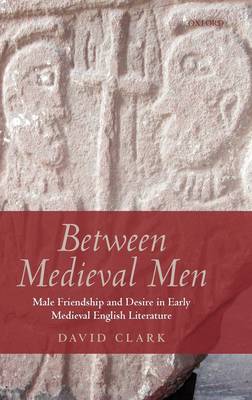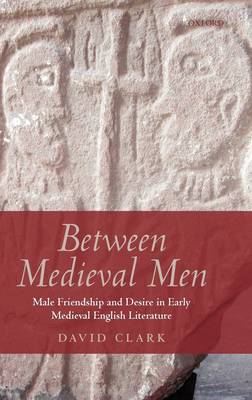
Wil je zeker zijn dat je cadeautjes op tijd onder de kerstboom liggen? Onze winkels ontvangen jou met open armen. Nu met extra openingsuren op zondag!
- Afhalen na 1 uur in een winkel met voorraad
- Gratis thuislevering in België vanaf € 30
- Ruim aanbod met 7 miljoen producten
Wil je zeker zijn dat je cadeautjes op tijd onder de kerstboom liggen? Onze winkels ontvangen jou met open armen. Nu met extra openingsuren op zondag!
- Afhalen na 1 uur in een winkel met voorraad
- Gratis thuislevering in België vanaf € 30
- Ruim aanbod met 7 miljoen producten
Zoeken
Between Medieval Men
Male Friendship and Desire in Early Medieval English Literature
David Clark
Hardcover | Engels
€ 201,45
+ 402 punten
Uitvoering
Omschrijving
Between Medieval Men argues for the importance of synoptically examining the whole range of same-sex relations in the Anglo-Saxon period, revisiting well-known texts and issues (as well as material often considered marginal) from a radically different perspective. The introductory chapters first lay out the premises underlying the book and its critical context, then emphasise the need to avoid modern cultural assumptions about both male-female and male-male relationships, and underline the paramount place of homosocial bonds in Old English literature. Part II then investigates the construction of and attitudes to same-sex acts and identities in ethnographic, penitential, and theological texts, ranging widely throughout the Old English corpus and drawing on Classical, Medieval Latin, and Old Norse material. Part III expands the focus to homosocial bonds in Old English literature in order to explore the range of associations for same-sex intimacy and their representation in literary texts such as Genesis A, Beowulf, The Battle of Maldon, The Dream of the Rood, The Phoenix, and AElfric's Lives of Saints.
During the course of the book's argument, David Clark uncovers several under-researched issues and suggests fruitful approaches for their investigation. He concludes that, in omitting to ask certain questions of Anglo-Saxon material, in being too willing to accept the status quo indicated by the extant corpus, in uncritically importing invisible (because normative) heterosexist assumptions in our reading, we risk misrepresenting the diversity and complexity that a more nuanced approach to issues of gender and sexuality suggests may be more genuinely characteristic of the period.
During the course of the book's argument, David Clark uncovers several under-researched issues and suggests fruitful approaches for their investigation. He concludes that, in omitting to ask certain questions of Anglo-Saxon material, in being too willing to accept the status quo indicated by the extant corpus, in uncritically importing invisible (because normative) heterosexist assumptions in our reading, we risk misrepresenting the diversity and complexity that a more nuanced approach to issues of gender and sexuality suggests may be more genuinely characteristic of the period.
Specificaties
Betrokkenen
- Auteur(s):
- Uitgeverij:
Inhoud
- Aantal bladzijden:
- 248
- Taal:
- Engels
Eigenschappen
- Productcode (EAN):
- 9780199558155
- Verschijningsdatum:
- 1/05/2009
- Uitvoering:
- Hardcover
- Formaat:
- Genaaid
- Afmetingen:
- 155 mm x 234 mm
- Gewicht:
- 521 g

Alleen bij Standaard Boekhandel
+ 402 punten op je klantenkaart van Standaard Boekhandel
Beoordelingen
We publiceren alleen reviews die voldoen aan de voorwaarden voor reviews. Bekijk onze voorwaarden voor reviews.











